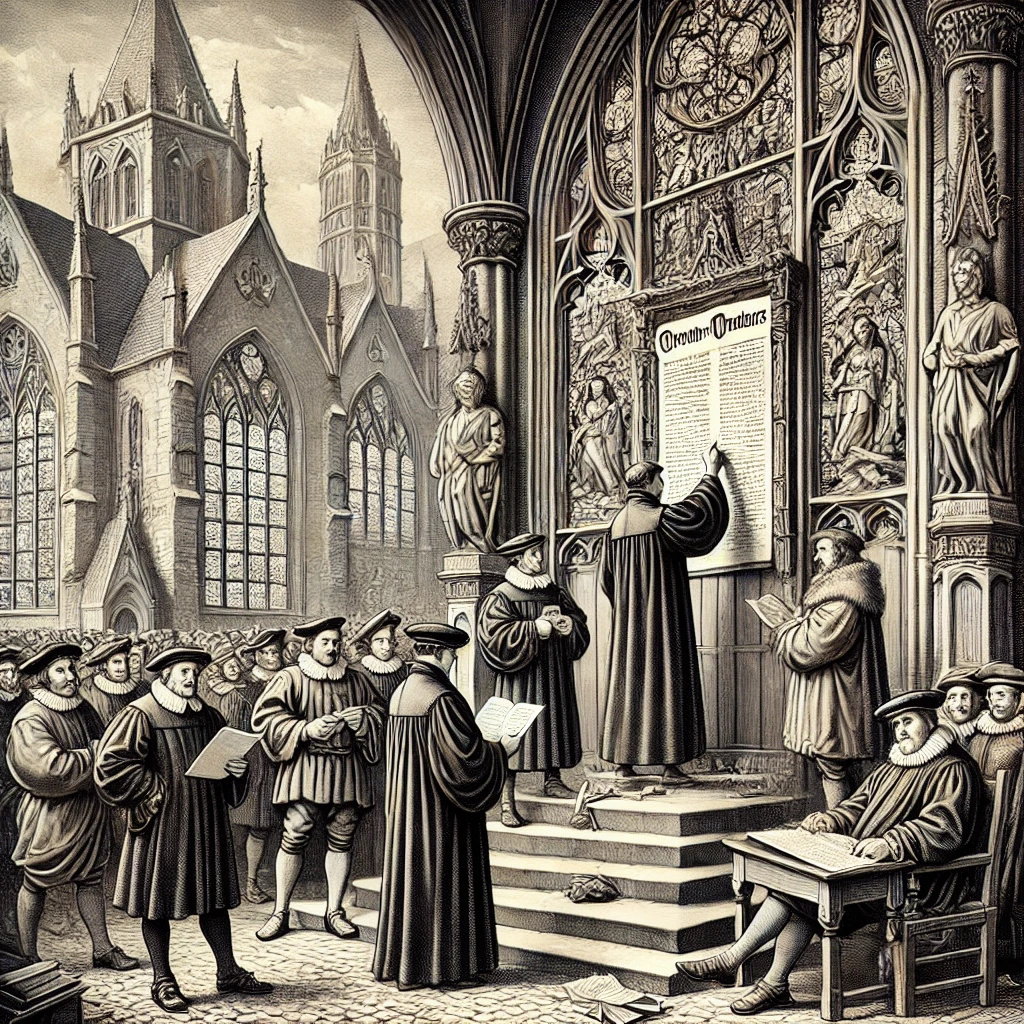Introduction
Protestant theology is one of the most influential branches of Christian thought. It emerged from the 16th-century Reformation, challenging the authority of the Roman Catholic Church. At its core, Protestantism emphasizes personal faith, Scripture as the ultimate authority, and salvation by grace through faith. These principles reshaped the religious landscape of the Western world.
The Roots of Protestant Thought
The Protestant Reformation began in 1517 when Martin Luther nailed his 95 Theses to the church door in Wittenberg. His main grievance was the sale of indulgences—essentially, buying forgiveness for sins. Luther and other reformers argued that salvation could not be purchased but was a gift from God. This sparked a movement that would lead to the formation of various Protestant denominations.
Sola Scriptura: The Authority of Scripture
One of the foundational principles of Protestant theology is sola Scriptura, meaning “Scripture alone.” This doctrine asserts that the Bible is the highest authority in matters of faith and practice. Protestants reject the idea that church traditions or papal decrees hold equal weight with Scripture. This belief led to a push for Bible translation into vernacular languages so that everyone could read it.
Sola Fide: Justification by Faith Alone
Another cornerstone is sola fide, or “faith alone.” This doctrine teaches that people are justified before God by faith, not by works. Luther emphasized that good deeds are a result of faith, not a requirement for salvation. This stood in stark contrast to the Catholic view that faith and works together contribute to salvation.
Sola Gratia: Salvation by Grace Alone
Protestants also hold to sola gratia, meaning “grace alone.” This means that salvation is entirely an act of God’s grace, not something humans can earn. Grace is God’s unmerited favor, given freely to those who believe. This eliminates any notion that human efforts contribute to redemption.
Solus Christus: Christ Alone as Mediator
Protestants affirm that Jesus Christ is the sole mediator between God and humanity (solus Christus). They reject the necessity of priests or saints as intermediaries. This belief reinforced the direct relationship between believers and God. It also diminished the role of the Catholic priesthood and sacraments in Protestant practice.
Soli Deo Gloria: Glory to God Alone
The final of the “Five Solas” is soli Deo gloria, meaning “glory to God alone.” This doctrine insists that all worship, honor, and praise belong to God alone. Protestant reformers opposed the veneration of saints, Mary, and religious relics. They sought to redirect devotion away from human figures and toward God.
The Role of the Church in Protestantism
Unlike Catholicism, which emphasizes a hierarchical church structure, Protestantism supports a variety of church governance models. Some Protestant traditions, like Anglicanism and Lutheranism, retain elements of hierarchy. Others, like Baptists and Congregationalists, emphasize local church autonomy. This diversity reflects the Protestant commitment to biblical interpretation and individual conscience.
Sacraments in Protestant Theology
Most Protestant traditions recognize only two sacraments: baptism and the Lord’s Supper (Eucharist). This is based on the belief that Christ explicitly instituted these two practices. Unlike Catholicism, which views sacraments as channels of grace, Protestants see them primarily as symbolic acts of faith. Some denominations, like Lutherans and Anglicans, hold a more sacramental view than others.
The Priesthood of All Believers
One of the most radical ideas of the Reformation was the priesthood of all believers. This doctrine teaches that every Christian has direct access to God and does not need a priestly mediator. It emphasizes personal responsibility in reading and interpreting Scripture. This idea democratized faith and contributed to the spread of literacy.
Predestination and Free Will
Protestantism contains a range of views on predestination and free will. Calvinism, named after John Calvin, teaches that God predestines certain individuals for salvation (unconditional election). Arminianism, on the other hand, argues that human free will plays a role in salvation. These debates continue to shape theological discussions today.
The Protestant Work Ethic
Max Weber famously linked Protestant theology to the rise of capitalism through what he called the “Protestant work ethic.” He argued that Calvinist beliefs in hard work, discipline, and frugality influenced economic development. This idea remains controversial but highlights the social impact of Protestant thought. Many Protestants see work as a form of worship and stewardship.
Denominational Diversity
Protestantism is not a monolithic tradition; it includes a wide variety of denominations. Lutheranism, Anglicanism, Reformed churches, Baptists, Methodists, and Pentecostals all fall under the Protestant umbrella. Each has distinct theological emphases while sharing core Protestant beliefs. This diversity reflects Protestantism’s emphasis on individual interpretation of Scripture.
Protestantism and Modernity
Protestant theology has played a key role in shaping modern democracy, human rights, and religious freedom. The emphasis on individual conscience influenced the development of democratic ideals. Many Protestant movements have been at the forefront of social justice initiatives. However, some traditions remain resistant to modern cultural shifts.
Criticisms of Protestant Theology
Critics argue that Protestantism’s emphasis on personal interpretation has led to theological fragmentation. With no central authority, Protestantism has splintered into thousands of denominations. Others claim that sola fide and sola gratia downplay the importance of ethical living. Despite these critiques, Protestantism remains one of the most dynamic expressions of Christianity.
Protestantism in the 21st Century
Today, Protestant theology continues to evolve in response to cultural and intellectual challenges. Some denominations embrace progressive theology, while others adhere to strict biblical literalism. The rise of non-denominational churches reflects a growing desire for a more personal faith experience. Protestantism remains a vital and influential force in global Christianity.
Conclusion
Protestant theology is rooted in the principles of Scripture, faith, grace, Christ, and God’s glory. It has shaped religious thought, culture, and society for over 500 years. While diverse in expression, Protestantism maintains a commitment to personal faith and biblical authority. Its legacy continues to influence both religious and secular life today.




